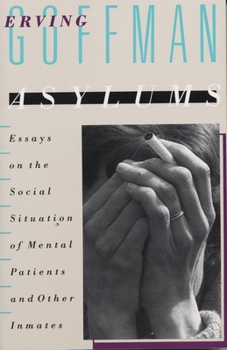Asylums: Essays on the Social Situation of Mental Patients and Other Inmates
Select Format
Select Condition 
Book Overview
Asylums is an analysis of life in "total institutions" -- closed worlds such as prisons, army training camps, naval vessels, boarding schools, monastaries, nursing homes and mental hospitals -- where the inmates are regimented, surrounded by other inmates, and unable to leave the premises. It describes what these institutions make of the inmate, and what he or she can make of life inside them. Special attention is focused on mental hospitals, drawing on the author's year of field work at St. Elizabeth's in Washington, D.C., one of America's most well-known institutions. It is the thesis of this book that the most important factor in forming a mental-hospital patient is the institution, not the illness, and that the patient's reactions and adjustments are those of inmates in other types of institutions as well. The first essay is a general portrait of life in a total instituion. The other three consider special aspects of this existence: the initial effects of institutionlization on the inmate's previous social relationships; the ways of adapting once in the institution; and the role of the staff in presenting to the inmate the facts of his or her situation.
Format:Paperback
Language:English
ISBN:0385000162
ISBN13:9780385000161
Release Date:November 1961
Publisher:Anchor Books
Length:400 Pages
Weight:0.64 lbs.
Dimensions:0.9" x 5.3" x 8.1"
Customer Reviews
5 ratings
Indispensable
Published by Thriftbooks.com User , 20 years ago
As a Nurse Lecturer I recommend this book to all my mental health students. I first read it as a first year trainee psychiatric nurse and it saved my career. There I was sitting in a care of the elderly ward in a mental hospital thinking "what the (* & ^ is going on here!?", ready to pack it in, and then I started to read this book. As I progressed through the book it all began to make sense and Goffman became my hero! What a man, what a researcher, what a writer. His theory is punctuated here and there with anecdotes and as such his writing is highly accessible. Fortunately, the world I experienced as a student and that Goffman wrote of is dying, but its vestiges linger and this book is still useful today. This book will one day become a historical account, but will always stand a a testimony to the need for and effectiveness of covert qualitative research.
A Little Classic of Sociology
Published by Thriftbooks.com User , 21 years ago
I'm not a sociologist, a student of sociology or really, even that interested in sociology. I read about this book in David Orland's, Prisons: Houses of Darkness, where Orland often referred to Goffman's work in this book. I was not disappointed.Goffman uses a mixture of field observation and references to literature to describe and critisize the theory and practice of the "Total Institution". As the reviewers note below, a "total institution" is an elastic concept. Goffman focuses on "strong" examples of T.I.'s: the mental hospital, prison, a 19th century man of war, monastery. Through these "strong" examples he fairly describes the concept and applies it well.Less clear is the implications of Goffman's concept to those institutions which are either "weak" total institutions or non-total institutions with total institution tendencies. After reading this book, I saw aspects of "total" institutions in almost every institution I cared to think about: schools, churches, courts, etc.I think it is fair to say that "All institutions dream of being total institutions." Therefore, this book has application beyond the world of "strong" total institutions. I recommend it highly.
Relevance tested in the 90s
Published by Thriftbooks.com User , 21 years ago
I based a sociological study and wrote a very well received paper - A Study of an English Open Prison as a 'Total Institution' - as part of my studies in 1994, in the form of a reappraisal of the books main points measured against covert observational findings. 'Asylums' was recommended to me and proved invaluable in understanding behavioural data from a symbolic interaction theoretical perspective. I was impressed with the work then and remain so now - to the extent that I am frequently drawn back to it still. It was still relevant at that time and it has lost none of that relevance. I heartily commend it!
Ignored
Published by Thriftbooks.com User , 23 years ago
This book should have had an effect. Apparently it has had none. As an ex-prisoner of an American psychiatric 'hospital' I can only say that this book brilliantly deconstructs the disabling and dehumanizing effect of such insitutions. Goffmann shows as much compassion as he does insight in this work, all the more remarkable in a work of sociology.
A Classic of Enduring Relevance
Published by Thriftbooks.com User , 25 years ago
The fact that this collection of essays has been in print for almost four decades is consistent with its enduring significance. Although Goffman draws on his research in mental institutions, his writings in this book have much broader relevance. In particular, they have to do with the nature of identity, the processes whereby organizations and groupings seek to change the identities and selves of their members, and the strategies used by group members to resist those changes. At a broader level, this book is about the relationship between person and the groups of which s/he is a part. Extremely well written, and very readable with excellent use of illustrative examples, this set of essays provides unparalleled insights into and understandings of the relation between person and society.





